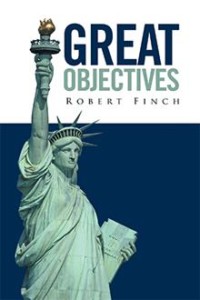Title: Great Objectives
Author: Robert Finch
Publisher: XlibrisUS
ISBN: 978-1-5245-0071-9
Pages: 532
Genre: Philosophy
Reviewed by: CC Thomas
Buy on Amazon
Pacific Book Review
In Great Objectives, author Robert Finch explains the thought process behind what is deemed the grand intentions of humans throughout history—religion, fame, power, and money. All these topics are covered in the book, but not necessarily in that order. Also these single ideas often mingle together until they are virtually indistinguishable. Finch does not serve as an advice-giver in this book, but rather as a reflective soothsayer and reasonable historian, searching for threads of such ideas of self-actualization throughout our past as humans.
Great Objectives starts with a history of ethical thought and provides strong evidence for naturalism as a guiding, ethical principal. Those with aversions to organized religion will find religious thought and principles are both succinctly and respectfully presented, instead of being denigrated. This is not a book that espouses one philosophy over another, but handles different philosophical thoughts fairly. While religion isn’t seen as a prevailing impetus for a moral and ethical life in Finch’s words, it also isn’t treated disdainfully. Those who are religious could, and probably should, read this book for a complete and thorough understanding of atheistic thought. Finch provides solid arguments that religion does not have to equal ethics.
Several interesting accounts for explanations of humanism are provided, including those of native tribes who used ethical and moral principles with no background of religious principles. Many accounts are also given for historical explanations for natural events using reason and evidence instead of supernatural aspects related to religions. Science and reasoning, as Finch points out, is a major part of our culture. Sadly, such evidence is generally lacking elsewhere, especially in modern times. Finch gives solid historical evidence for such philosophical thinking and the book illustrates so wonderfully the train of thought involved in the thinking process, explaining how man’s great objectives have changed and modified over time.
Finch’s book reads more like a collection of essays than a narrative. While the book begins with a solid historical basis for humanistic thoughts and beliefs, the rest of the book reads as a manifesto furthering and solidifying those thoughts in a typical life. Finch takes different topics, such as economics, law, and art, and explains those concepts within the framework of humanistic thought. Each chapter and topic has evidential treatment given by noted essayists and novelists and reading the book is an affirmation for those who hold such viewpoints. It is a book that will make any reader think—both those who disagree with the humanist viewpoint and those who are humanists will invariably learn about new topics and theories.
This book is a cerebral exercise from beginning to end and makes for an interesting read, no matter the philosophical persuasion of the reader. What also makes Finch’s book so delightful are the solid evidential examples that float through each chapter. It is not just a book of theories, as many philosophical books are; instead, Finch’s book traces humanistic thought throughout our long history on earth and solidifies this perspective in a creative and capable way.



Follow Us